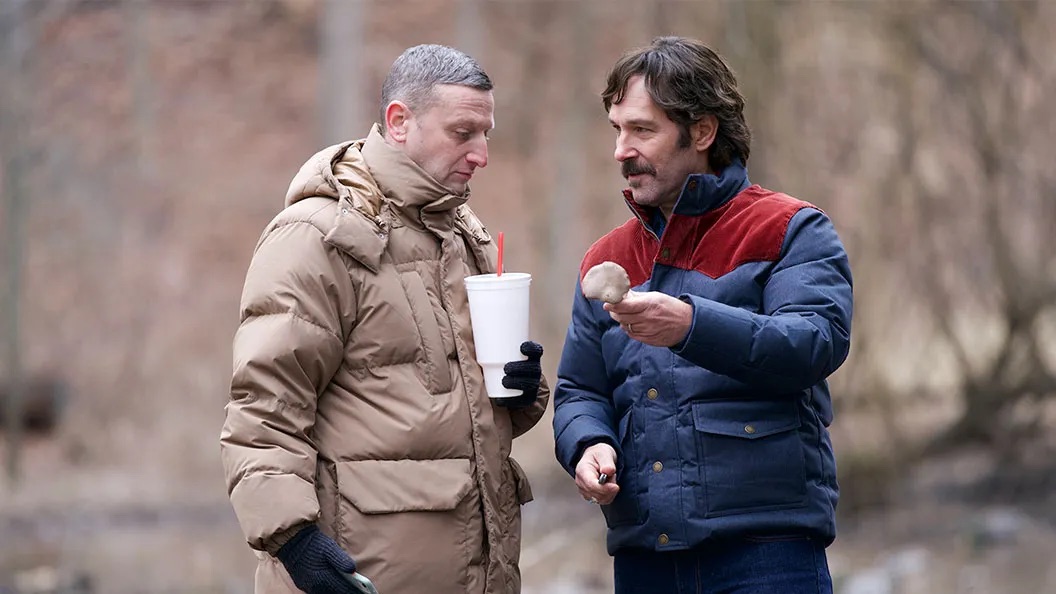Craig Waterman is a middle class suburbanite who works at an office company that makes their clients’ products more addictive — whether those products are apps, foods, or politicians. In lieu of friends, Craig is casual acquaintances with his co-workers, and he looks forward to seeing “the new Marvel” because he hears it’s so crazy that it’s literally driving people insane. His entire wardrobe comes from a company called Ocean View Dining, he’s obsessed with trying the “SEAL Team 6” special at a local restaurant (a 22,000-calorie meal that replicates what its namesake ate after killing Osama Bin Laden), and his wife Tami still kisses their teenage son on the mouth.
From a distance, he might appear to be the most normal man in America, but Craig Waterman is (obviously) played by “I Think You Should Leave” maestro Tim Robinson, so if you look just a little bit closer it snaps into focus that he’s more like an alien impostor who could only figure out how to mimic 99.97% of human behavior, and has grown to be completely defined and enraged by the tiny portion that continues to elude him. Then again, that might be the most normal thing about him. Sure, the average man probably wouldn’t eat an entire bar of soap in the middle of a group hang as a form of self-punishment for violating bro code, but who among us doesn’t want to be accepted? Who among us doesn’t feel — either occasionally or always — like social codes are a chaotic second language that other people were born speaking like a mother tongue? Who among us wouldn’t sell our souls for even the briefest taste of what everyone else seems to enjoy for free?
Robinson’s obsessive and volatile (but also hyper-earnest) screen persona so perfectly crystallizes a modern form of impotent male rage that it’s become a language unto itself on the internet, where everyone leads with their id. But Andrew DeYoung’s frequently hilarious “Friendship” — which stretches its star’s comic schtick to multiplex dimensions in a movie that feels very much like a feature-length “I Think You Should Leave” sketch — helps clarify that Robinson’s humor is rooted in confusion more than anything else.
Like so many of Robinson’s characters, Craig walks through life as though he’s the only person on Earth who missed a planet-wide memo on how to behave. And like so many of Robinson’s characters, we love him for all of his violent weirdness because he’s pathologically incapable of not being himself. It’s a dynamic as fixed and fundamental as Newton’s Laws of Motion: The harder that Craig tries to act “normal,” the more broadly demented he becomes.
With a character like that, “he tries to create a lasting male friendship” is enough of a premise to crack open a Pandora’s Box of howling ridiculousness, and “Friendship” makes the most of it without ever fully submitting to its madness. Likened to “‘I Love You, Man’ for sickos” by pretty much everyone who saw it at TIFF (in part because Paul Rudd is in both, though he’s graduated to the aspirational role so here that Robinson can play the everyman instead), DeYoung’s debut strips that amiable charmer of its Apatow shine and replaces it with something much weirder and more desperate — something that appears to assume the shape of a bromantic comedy, only to speed through the good times so that it can savor the messy breakup that inevitably follows.
Craig likes to spend most of his free time making weird faces in his recliner, but when the mailman accidentally delivers the Watermans a package intended for their new neighbors, Tami (a no-nonsense Kate Mara as Robinson’s perfect foil) tells her husband to bring the box next door. And so Craig comes to meet Austin Carmichael, a mustached local weatherman who Rudd plays like a sadder and more self-conscious Brian Fantana. Austin’s got it all figured out: lots of hair, a sick catchphrase (“stay curious”), and a weirdly thorough knowledge of the local sewer system. Needless to say, Craig wants to be his BFF.
Against all odds, that seems like a distinct possibility at first, especially after our man gives Austin the confidence he needs to graduate from the evening to the morning news. But Craig is gonna Craig, which proves to be a problem when he’s invited to hang out with the rest of Austin’s friend group; the night ends with shattered glass, bloody noses, and Austin’s dawning realization that he may not want Craig in his life. You’ll be shocked to discover that Craig does not take the rejection well, and soon begins to spiral out in a way that threatens to get him fired from his job, alienate his kid Steven (Jack Dylan Grazer), and push Tami back to the firefighter ex-boyfriend she keeps weirdly dropping into every other conversation. Things quickly go from bad to worse, and it isn’t long before Craig finds himself paying the kid from the local cell phone store $100 for a lick of his toad in the hopes that the venom’s high will ease his pain.
What follows is maybe the single funniest drug-trip sequence ever filmed, and — for reasons that are best left ambiguous — a textbook example of this movie’s exceedingly careful relationship with absurdity. “Friendship” definitely flirts with a heightened sense of reality from time to time, but DeYoung is too invested in the reality of his characters to go full “Tim and Eric Awesome Show, Great Job!” with their lives. More often than not, that works to the advantage of a feature that needs to sustain a certain degree of dramatic integrity for 100 minutes. At the same time, however, a number of scenes scream to be pushed just a bit further into strangeness, only to feel like missed opportunities as they sag away from laugh-out-loud uproar.
Perhaps that’s because DeYoung wants to preserve the quiet desperation of Craig’s life, which he does with aplomb (the bitter chill of Andy Rydzewski’s cinematography and the diaphanous pulse of Keegan DeWitt’s score lend crucial layers of texture). Or perhaps that’s just because he knows that Robinson can pan enough priceless gold from the kind of interstitial moments that most comedies would pave right over. One of the movie’s funniest bits is a stand-alone episode that finds Craig putting too much coffee in his cup and trying to deal with it in the middle of a business meeting; another starts with a guy bumping into his wife’s chair at a restaurant.
It’s easy to imagine how a version of this film might have descended into vaguely connected sketches (and still would have been one of the funniest pure comedies in forever despite its shapelessness), but there’s a clear and rewarding intentionality to DeYoung’s plotting, and it pays off with a finale that — better than almost any scene before it — perfectly threads the needle between all of the movie’s competing energies. You see, a guy like Craig is never going to be the world’s chillest hang. He’s never going to accurately inuit the “cool” response in a social situation. But he’s also never going to let that stop him from doing what he thinks is right, and dammit if there isn’t something beautiful about how that lets the rest of us fakers stay nice and cozy behind our bullshit.
Grade: B+
“Friendship” premiered at the 2024 Toronto International Film Festival. It is currently seeking U.S. distribution.
Want to stay up to date on IndieWire’s film reviews and critical thoughts? Subscribe here to our newly launched newsletter, In Review by David Ehrlich, in which our Chief Film Critic and Head Reviews Editor rounds up the best reviews, streaming picks, and offers some new musings, all only available to subscribers.
Want to stay up to date on IndieWire’s film reviews and critical thoughts? Subscribe here to our newly launched newsletter, In Review by David Ehrlich, in which our Chief Film Critic and Head Reviews Editor rounds up the best reviews, streaming picks, and offers some new musings, all only available to subscribers.



